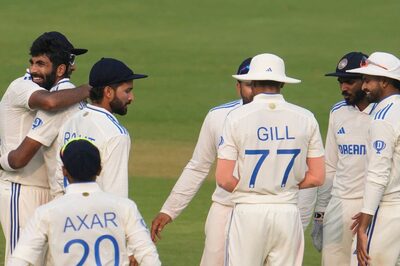
views
Who knew that fact-checkers would be the biggest peddlers of fake news? Who knew that such fake news peddled by fact-checkers would be the proverbial straw that broke the Twitter camel’s back? That “fact-checking” is prone to being heavily manipulated based on the chosen timelines and interpretation is well-known. After all, the partisanship of “fact-checking” was blatant for quite some time. However, the social capital built by these organisations gave them an unprecedented bully pulpit—where they would effectively blackmail their way to both credibility and funding—bypassing editorial discretion and blurring conflicts of interest.
As of sometime last night, Twitter is the first and only company to have lost the intermediary protections in India’s history. It comes close on the heels of a sickening incident in Ghaziabad where a poor old man was viciously assaulted by a group of hooligans, his beard shaved off and slapped around. For an amateur to tweet the video was still understandable. But the lack of accompanying audio should have raised several red flags for any “fact-checker” worth their salt. Yet, it was tweeted out, implying in no uncertain terms that this was a communal attack.
A few hours later another video emerged of the poor man, in a completely different setting in the company of a religious leader, saying that the hooligans had forced him to chant “Jai Sri Ram” and this was used to conclusively settle the communal nature of the incident. Again, this too should have raised red flags and led back to the question of why did the original video lack audio. However given the “credibility” that fact-checkers enjoy, and their demonstrable abuse of extortive powers, the interpretation of the “fact-checker” was deemed unquestionable and several news outlets and Twitterati ran with the story.
ALSO READ | Facebook, Google, Amazon Have Breached Privacy & Shaken the Very Foundations of Democracy
A mere hours’ worth of investigation by the UP Police revealed that in fact the vast majority of those who had perpetrated the crime were Muslim and the audio had been deliberately removed in order to turn the video into a flashpoint for communal rioting. Despite overwhelming evidence that the story as presented on Twitter was false, Twitter not only failed to mark the tweets as misleading and take preventive action in face of an explosive communal situation, as they had during the January 26 riots, Twitter chose not to act. As the case evolves, there are three issues to be considered: culpability of the parties involved, the continuing defiance of Twitter to Indian law and its deliberate mischief in stoking civil strife, and the cartelised blackmail model into which “fact-checking” has evolved.
First up, we need to differentiate reporting from fact checking. The job of news outlets is to report events as they happen, and the job of Twitterati is to outrage. Mistakes frequently happen here as the flow of events is so rapid. That is why the naming of politicians, journalists and news-outlets in the FIR filed by the UP Police is a very slippery slope and mixes up the real criminality here—that of the fact-checker, whose only job is to ascertain the facts. So, how does criminality extend from the actual peddler of fake news to the dissemination platform?
Much of it has to do with Twitter’s antecedents and opaque, possibly improper business tie-ups in India. Twitter’s messianic self-image, its role in unseating government and stoking political violence in the past (Egypt, Syria, Tunisia) and its blatant politics—evidenced by the ban on President Trump—are not in doubt.
Moreover, its ongoing refusal to comply with Indian law, denying information to an ongoing investigation and seeking colonial-style extraterritoriality for its actions only made its intent very clear. Its tie-up with the said “fact-checking” agency is particularly curious because it violates several corporate standards and reeks of nepotism.
For a start, the “fact-checking” partner has not had their International Fact-Checking Network (IFCN) membership renewed since 2019—and therefore did not comply with international “fact-checking” “standards”—a critical component in absolving Twitter (the platform) of responsibility for the accuracy of the “fact-check”. The basis of the hiring and compensation given remain unknown, and place the blame squarely on Twitter for failing due diligence.
However, the most worrying aspect has been IFCN’s own lax standards at enacting checks and balances while fact-checking has essentially turned into a front for blackmail and extortion. The severe subjectivity of fact-checking lends itself to blatant abuse without checks and balances of any kind, and in governance-deficit countries like India, this is a model that is bound to be exploited. No surprise then that the commercialisation of fact-checking in India has been cornered, not because of credibility or accreditation, but mostly because of delegitimisation of other fact-checkers and “fact-checking” specifically targeted at outlets that do not hire or share business with specific “fact-checking” agencies.
ALSO READ | In the Name of Freedom of Expression, Twitter is Waging War against the Indian State
This is no joke. The COVID-19 pandemic reached its epic proportions, precisely because of such unchecked conflict of interests and self-referential hiring by global health organisations, NGOs, academia and journals who were promoted based not on ability but on cronyism, effectively shutting out all dissent. Today, it is critical we do not throw the baby out with the bathwater, because in the information age, combating of misinformation is critical. But, as the latest fracas with Twitter and the “fact-checker” show, nepotism and cronyism will irreparably damage a critical service, exactly when it is most required. What is needed is transparency, clear guidelines, and the merciless crushing of personal agendas peddled as “facts”.
Read all the Latest News, Breaking News and Coronavirus News here.


















Comments
0 comment